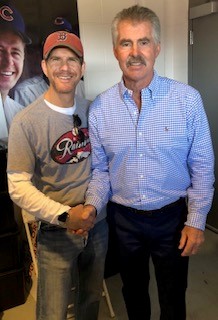
The Swallow Before the Choke
We are deep into Spring Training, which got me thinking about a trip to Arizona we made about six years ago. While visiting Sloane Park in Mesa, I was lucky enough to meet Bill Buckner. Billy Buck, he of the 2,715 hits and career .289 batting average, but also he of the “slow roller up along first.” As a lifelong Red Sox fan, it was an honor to meet Buckner and have an ever-so-brief conversation with him about his career and the exemplary example he set for athletes dealing with adversity. I was deeply saddened when he passed away the following year.
In the aftermath of the 1986 World Series, but contrary to reported stories, and despite haranguing from irredeemable baseball fans, Buckner did not flee Boston. Rather, he moved his family to Idaho, where he had previously purchased a ranch, and began buying real estate. However, Buckner will always be remembered for the most ignominious “meg” in the history of Major League Baseball.
The whole Buckner saga never sat right with me, as (1) I am not sure Buckner, even if he fielded the ball cleanly, with his addled ankles and sore feet, beats the speedy Mookie Wilson to first base, and (2) even if he does get there in time, that just pushes the game to the 11th inning. There were no guarantees from there. In short, I never believed that Buckner lost that game for the Red Sox. But the “goat” label stuck to Buckner nonetheless.
There have been many goats in baseball history – guys who make the wrong play at the wrong time, and ostensibly cost their team the game. And because baseball (as well as life) is about sequencing, it is often the last guy standing that gets the condemnation. However, before that goat ever has a chance to “blow” the game, some other player or players need to make some mistakes. I call this “the swallow before the choke.” And, fortunately for the swallower, history often forgets their names, their failures, and their role in the gut-punching final moment. Those players need to bear some of the brunt and share the blame.
Let’s take a look at a few:
2003 NLCS: Game 6 / Top of the 8th Inning
Steve Bartman may be the biggest goat never to don an MLB uniform. His attempt to catch Luis Castillo’s foul ball, which resulted in Moises Alou not catching the foul pop for the second out of the inning, opened the floodgates for the Marlins. Putting aside whether or not Alou would have actually caught the ball, there is still a ton of blame to go around. For our purposes, the swallows are Mark Prior and Álex González.
Prior had already given up a one-out double to Juan Pierre, so the inning wasn’t clean. Further, not only was he not able to recover after the “Bartman Incident,” his ball four to Castillo went to the backstop, allowing Pierre to take third. Prior then gave up a single to Ivan Rodriguez on an 0-2 count. But, even at that point, the Cubs still led 3-1. Enter Alex González.
Prior induced Miguel Cabrera to bounce into a tailor-made 6-4-3 double play to put the Cubs three outs away from the World Series. But, as we know, González booted the grounder, loading the bases for Derrek Lee. Lee – who became the Cubs’ first baseman the following season – promptly doubled home the tying runs (off Prior, natch). Kyle Farnsworth then came into the game to intentionally walk Mike Lowell, give up a sacrifice fly to Jeff Conine, intentionally walk Todd Hollandsworth, and then give up a three-run double to Mike Mordecai. Pierre batted again, and singled to cap off the scoring, and the Marlins ultimately won the game, 8-3. Bartman needed a police escort out of the stadium, and was forced to move out of state; documentaries have been made about him. But other than an amazing reference to González in this season’s finale of television’s “The Bear,” it would seem that González and Prior have escaped the ignominy of that fateful eighth inning.
1951 Final Game of the Season / Bottom of the 9th Inning
Ralph Branca’s name will always live in infamy in baseball circles. Despite a 12-year career that saw him win 88 games, make three All-Star teams, and finish with a 3.79 ERA and a 105 ERA+, Branca is known for one pitch, swung at by one batter, ending one pennant chase.
Ironically, the Dodgers and Giants never should have been playing in that three-game playoff, as the Dodgers were 11.5 games ahead of the Giants on August 11, and still up 4.5 games on September 20, with ten to play. There are any number of reasons that the Dodgers should have won the pennant in 154 games*, saving Branca from his vilification.
*Note: MLB did not expand to 162 games until 1961.
Very few people remember that Don Newcombe took a 4-1 Dodgers lead into that fateful ninth inning. Newcombe gave up two singles to start the frame, got a pop-out, and then surrendered a double to Whitey Lockman. Branca came in from the bullpen (pitching on one day’s rest) up two, with the tying runs in scoring position. Bobby Thomson hit his second pitch over the wall in left for the “Shot Heard Round the World.” Branca threw the final pitch, but Newcombe threw many before him, and the Dodgers as a whole wrapped their hands around their collective throats.
1986 ALCS: Game 5 / Top of the 9th Inning
Much has been written about Boston’s incredible comeback against the then-California Angels with two outs in the top of the ninth inning of Game 5 of the 1986 ALCS. And many people have mourned the sad tale of Donnie Moore, who gave up Dave Henderson’s two-run home run, and the lead, in that ninth inning. But, many people forget two important facts about that game (aside from Reggie Jackson putting his glasses away and hugging Gene Mauch with one out to go, and putting aside the police on horseback lining the field, both of which tempted Moira, the Greek God of Fate):
(1) After Mike Witt gave up Don Baylor’s two-run homer to make it a 5-4 game, Gary Lucas came in to face Rich Gedman. Lucas promptly hit Gedman in the head with his first pitch, putting the tying run on base and bringing the lead run to the plate; and
(2) The Angels tied the game in the bottom of the ninth
In fact, even after giving up four runs and the lead in the top of the ninth, the Angels were in prime position to win this game a half an inning later. They went single, sacrifice, single, single, intentional walk. With the game now tied at six, the Angels had the bases loaded with one out, and Doug DeCinces and Bobby Grich coming up.
DeCinces hit 26 homers in 1986, and also had four sacrifice flies. But on this occasion, all he could muster was a weak fly to right field, not deep enough to score Rob Wilfong from third. Grich, in his final season, only played 98 games, but still managed an OPS+ of 109. In the sixth inning, Grinch hit a two-run home run to give the Angels a 3-2 lead. But, with two outs in the bottom of the ninth, with the bases loaded and the pennant on the line, Grich hit a soft liner back to Steve Crawford on the mound to end the threat.
Had either DeCinces or Grich knocked in the winning run, the Angels would have gone to their first World Series; Henderson’s home run would have become merely a footnote; and Donnie Moore would never have been required to pitch the 10th and 11th innings.
2011 World Series: Game 6 / Bottom of the 9th Inning
Buster Olney (and others) have called this the greatest baseball game of all time. It ended with David Freese’s walk-off home run in the bottom of the 11th. But it was the bottom of the ninth where fate laid its hand.
We all remember how feeble Texas Rangers right fielder Nelson Cruz looked going back to the wall on Freese’s opposite-field line drive with two outs, two strikes, and two on. We all want to blame Cruz for costing the Rangers the World Series. Sure, had Cruz looked more like Steven Kwan than Michelle Kwan on that play, the Rangers may very well have won their first World Series title 12 years earlier.
But, if Neftali Feliz hadn’t given up a first-pitch double to Albert Pujols with one out, or hadn’t immediately walked Lance Berkman on four straight pitches, then there wouldn’t have been the tying runs on base for Freese to drive in. Feliz owes a ton of gratitude to Cruz for making people forget.
1986 World Series: Game 6 / Bottom of the 10th Inning
There is simply no need to go into further detail about the bottom of the 10th inning of Game 6 of the 1986 World Series, as Buckner carried the weight of Calvin Schiraldi and Bob Stanley for nearly 20 years – at least until the Red Sox reversed the “Curse of the Bambino” in 2004. In the hearts of many in New England and around the world, Buckner was the reason that the Red Sox lost that game and lost the World Series. The facts, however, tell a different story.
Recency bias works in both the positive and the negative. We remember the last thing we saw, good or bad. We tend to forget the moments leading up to the final moment. We burn in effigy the player we deem to be the “goat.” But history has shown us, time and again, that there is nearly always some other player or players swallowing hard before the final choke.
PLAY BALL!!
